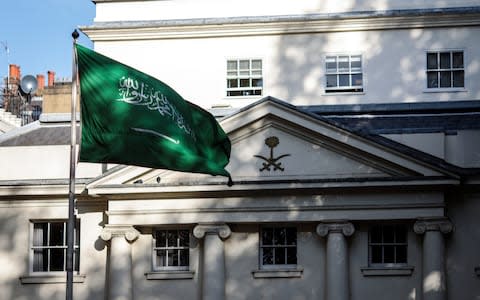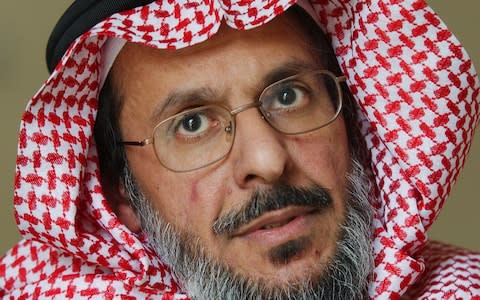From blackmailing princes to murdering journalists: how Saudi Arabia’s spy network has expanded under Mohammed bin Salman
Inside the Georgian mansion in Mayfair that houses Saudi Arabia’s embassy in London, two offices of Saudi intelligence operatives are busy at work.
The first office belongs to the General Intelligence Presidency, Saudi Arabia’s foreign intelligence agency. Its staff are engaged in the “normal” work of spies, meeting with MI6 to discuss Britain and Saudi Arabia’s shared fight against al-Qaeda or to swap secrets on Iran.
The second office has a darker purpose. There the staff of the Mabahith, Saudi Arabia’s secret police, are tracking people of interest inside the UK.
Its operatives are watching obvious targets like Saudi dissidents who have gone into exile in Britain, or London-based Islamists whose ideology is seen as a threat to Saudi Arabia’s absolute monarchy.
But they are also keeping tabs on Arab businessmen and the decadent lives of Gulf royals living the UK. The Mabahith’s spies are especially interested in compromising material they can use as blackmail to further Riyadh’s interests.
“These guys gather the dirt and they hold it until directed,” said a former Saudi embassy employee, who spoke on condition of anonymity. “They want to know who is sleeping with who, who is drinking and doing drugs, who is spending money they don’t have.”

The set-up in the London embassy is replicated at Saudi diplomatic posts around the world, forming a vast web of spies watching the kingdom’s enemies and surveilling its own people.
While this apparatus has existed for years, it has become more aggressive and more violent under Mohammed bin Salman, the crown prince, who controls the Saudi security services.
His ambition to silence critics abroad and stomp out political rivals at home has depended on a new ferocity in the intelligence agencies. The murder of Jamal Khashoggi is just the most extreme example.
“For many decades Saudi Arabia had a system in which the king sought to develop a policy consensus within the royal family, the clerical establishment, and the entrepreneur elite,” said Bruce Riedel, a former CIA officer who now heads the Intelligence Project at the Brookings Institute.
“That has changed profoundly in the last few years. Instead of a consensual system they have moved to a very autocratic system, which relies much more on the intelligence services hounding out dissent at home and abroad.”

Mr Khashoggi was no stranger to the craft of the secret police or how its methods changed over time. In the mid-2000s he worked at the Saudi embassy in London as an advisor to the ambassador, Prince Turki bin Faisal. The prince was Saudi Arabia’s spy chief before moving to the UK.
One of Mr Khashoggi’s embassy colleagues was Maher Mutreb, a Saudi intelligence officer stationed in London. Mr Mutreb is now under arrest in Saudi Arabia as part of the 15-man squad accused of Mr Khashoggi’s murder.
In his Washington Post column, Mr Khashoggi noted the aggression of Saud al-Qahtani, a senior aide to Crown Prince Mohammed who was sacked over the weekend amid the fallout out of the killing. The prince’s aide made no secret of his hatred for dissidents and once asked his 1.35 million Twitter followers to give him names for a blacklist.
Mr Khashoggi pointed to the tweet as an example of how unrestrained Saudi repression had become in the last two years. “Writers like me, whose criticism is offered respectfully, seem to be considered more dangerous than the more strident Saudi opposition based in London.”
Saudi Arabia’s spies have always focused on the UK, which has given safe harbour to many Saudi dissidents as well as Islamists and anti-monarchists from across the Middle East.
One of their targets has been Sa’ad al-Faqih, the leader of Movement for Islamic Reform in Arabia, a UK-based Saudi opposition group that campaigns to replace with the royal family with an Islamic government.

Dr Faqih was attacked at his home in Willesden Green, northwest London, in June 2003 by two men who he said claimed to be plumbers. They tried to spray chemicals in his face and then attacked him with a spanner but he was able to fight them off.
He believes the two white men were British gangsters hired by Saudi Arabia to kidnap him, a claim that the kingdom has always denied.
Dr Faqih has not faced any more physical attacks since 2003. But he has felt a heightened threat since Crown Prince Mohammed began to gather power three years ago and he started taking new security precautions. “We feel extra danger because we know that this boy is reckless and impulsive,” he said.
Saudi dissidents were rattled by an incident in August this year on the pavement outside Harrods in central London. Ghanem al-Masarir, a popular Saudi political satirist who often mocks Crown Prince Mohammed, was confronted and attacked by two Saudi men.
يا شين المهايط فـ الخلا ما يحمّس
يبربر على اسياده .. ولا احدٍ درا به
ٰ
سلامي على يـدٍ عطته ( المخمّس )
هذي اصغر ردود السعودي والاجابه��������#جلد_الكلب_غانم_الدوسري@GhanemAlmasarirpic.twitter.com/axejGsqNAt
— بيع قصايد جزله .. (@Be3_600) September 9, 2018
“They were shouting about the king and Mohammed bin Salman and they said: ‘how dare you insult al-Saud?’” Mr Dosari said. He is convinced that the men were put up to the attack by Saudi intelligence.
“I don’t think they were trying to kill me or kidnap me but they wanted to insult me and to send a message that I was not safe where I was,” he said. Video footage of the attack was widely shared by pro-Saudi Twitter accounts under a hashtag celebrating the attack.
The Saudi embassy in London did not respond to multiple requests for comment for this story. Saudi Arabia insists that Mr Khashoggi's death was the result of "a rogue operation" which was not ordered by the government.
Before the killing in Istanbul made global headlines, the starkest example of the Saudi intelligence's new aggression was an apparent campaign to kidnap rebel princes in Europe and bring them back to Saudi Arabia.
According to the BBC, three princes who had fallen out with the royal family have been captured since 2015. One, Prince Sultan bin Turki, a grandson of King Abdulaziz, accepted a flight on a Saudi government private jet from Paris to Cairo in January 2016.
The prince went to sleep on the flight and when he awoke he realised the jet was in fact heading Saudi Arabia. He was dragged off the plane by Saudi agents and is believed to be under house arrest to this day.
Saudi dissidents joke darkly that Mr Khashoggi’s death probably means they are safer now than they have been in years because Riyadh will be unwilling to risk another international scandal. But none believe the danger has fully passed.
Over the weekend, King Salman ordered his ministers to prepare reforms of the Saudi intelligence services to prevent another incident like Mr Khashoggi’s death. No one should expect sweeping changes: the head of the reform committee is none other Crown Prince Mohammed himself.
